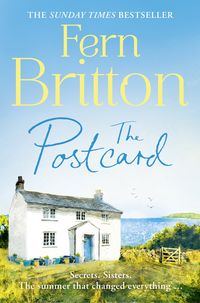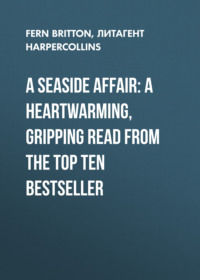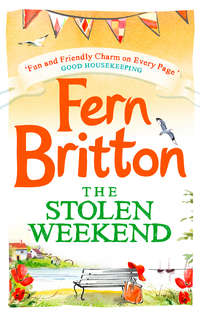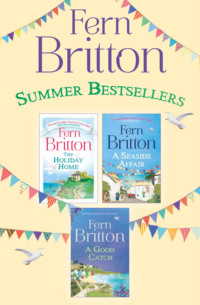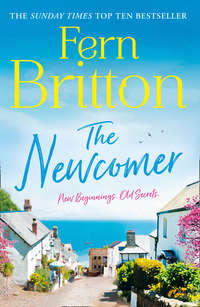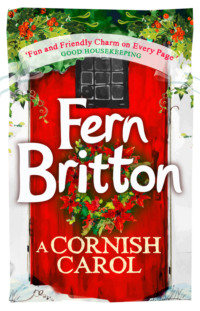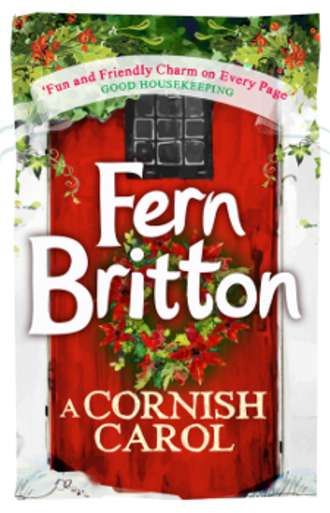
Полная версия
Hidden Treasures


FERN BRITTON
Hidden Treasures

Copyright
HarperCollinsPublishers
1 London Bridge Street
London SE1 9GF
www.harpercollins.co.uk
Published by HarperCollinsPublishers 2012
Copyright © Fern Britton 2012
Cover layout design © HarperCollinsPublishers 2011 Cover illustration © Robyn Neild Lettering © Ruth Rowland
Fern Britton asserts the moral right to be identified as the author of this work
A catalogue record for this book is available from the British Library
This is a work of fiction. Names, characters, places, and incidents either are the products of the author’s imagination or are used fictitiously. Any resemblance to actual events, locales, organizations, or persons, living or dead, is entirely coincidental and beyond the intent of either the author or the publisher.
All rights reserved under International Copyright Conventions. By payment of the required fees, you have been granted the non-exclusive, non-transferable right to access and read the text of this e-book on-screen. No part of this text may be reproduced, transmitted, down-loaded, decompiled, reverse engineered, or stored in or introduced into any information storage and retrieval system, in any form or by any means, whether electronic or mechanical, now known or hereinafter invented, without the express written permission of HarperCollins.
Source ISBN: 9780007362714
Ebook Edition © March 2012 ISBN: 9780007419418
Version: 2017-12-21
To my Cornish friends who have welcomed us so generously.
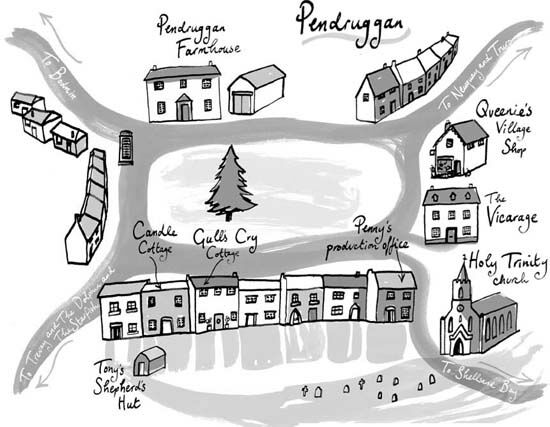
Contents
Cover
Title Page
Copyright
Dedication
Map
Prologue
Part One
Chapter 1
Chapter 2
Chapter 3
Chapter 4
Chapter 5
Chapter 6
Chapter 7
Chapter 8
Chapter 9
Chapter 10
Chapter 11
Chapter 12
Chapter 13
Chapter 14
Chapter 15
Chapter 16
Chapter 17
Chapter 18
Chapter 19
Chapter 20
Chapter 21
Chapter 22
Chapter 23
Chapter 24
Chapter 25
Chapter 26
Chapter 27
Chapter 28
Chapter 29
Part Two
Chapter 30
Chapter 31
Chapter 32
Chapter 33
Chapter 34
Chapter 35
Chapter 36
Chapter 37
Chapter 38
Chapter 39
Chapter 40
Chapter 41
Chapter 42
Chapter 43
Chapter 44
Chapter 45
Chapter 46
Chapter 47
Chapter 48
Chapter 49
Chapter 50
Chapter 51
Chapter 52
Epilogue
Acknowledgements
Keep Reading
By the same author
About the Publisher
Prologue
Violet Wingham straightened up and allowed herself the pleasure of feeling the warm evening air on her face. This would be her last night at Gull’s Cry. During the seventy-seven years she’d lived in Pendruggan, tending her garden and her cottage, she had always prided herself on being no bother to anyone. Determined that wasn’t about to change now, at the age of ninety-six, Violet had made up her mind to place herself in a nursing home until God took her back to her family.
Brushing the damp earth from her fingers, she took one last look at the freshly dug soil. ‘Goodbye, my darling. For now,’ she said softly, then returned the spade to the old privy which doubled as her garden shed and walked back into her house for the last time.
1
The sound of a tractor bumping over the cattle grid of the farm across the lane rudely awoke Helen. Yesterday it was the cockerel at the village farm. She wasn’t used to hearing such rural sounds. Not yet, anyway.
Lying in bed with her eyes still shut, savouring the warmth of her duvet and the soft cashmere blanket on top (a house-warming present from Gray, her ex), Helen felt more comfortable than she had in years. Nothing to get up for, nobody to deal with and the whole day to herself. She felt her body start to get lighter and was ready to drift off again when the phone rang.
‘Who the f … ?’ she scrabbled for the receiver. ‘Hello.’
‘Mum, it’s me.’ It was Chloe, her daughter. ‘So how’s the new cottage and Cornish life? Got all the yokel men beating a path to your door yet?’
‘Darling, I’ve only just woken up. What time is it?’
‘Nine forty-five.’
‘Well, that’s virtually the middle of the night as far as I’m concerned.’
‘Sorry, Mum, it’s just that I’ve been thinking about you so much. Are you OK?’
‘Yes, fine.’ Helen sat up and plumped the pillows behind her. ‘But I’m desperate for you to come and have a look at the cottage. It’s so pretty.’
‘I can’t wait.’
‘Well, come and see me. How about this weekend?’ pressed Helen.
‘Maybe. Sorry, Mum, got to go, a customer’s just walked in. Speak later. Love you.’
The lovely Chloe, thought Helen. Wasting her first-class Cambridge degree in Classics by working in a charity shop in Bristol. Her social conscience and a passion to save the world from environmental collapse meant that she recycled everything – even earbuds, if she could. Perhaps she did? Chloe was only twenty-two but seemed so old for her years. A single-minded single woman. By the time Helen was Chloe’s age she’d been married a year and had just become a mother to Sean. Chloe came along three years later.
And now they were all grown-up. Sean was something big in advertising and, despite the economic mess, he could apparently afford a Porsche Boxster. Should she worry about her children a bit more, she wondered.
‘No,’ she said out loud. ‘They can worry about me for a change.’
Helen climbed out of bed, and was thrilled once again by the cream deep-pile carpet that her feet sank into. As her mother used to say, ‘It’s never your extravagances you regret, only your economies.’
Had it been an extravagance to give up her metronome life in West London? She’d amazed herself with the speed and ease of her leap from Chiswick Woman to Cornish Country Woman. One minute she was ironing Gray’s shirts and playing the apparently contented wife, the next her marriage had finished. It was almost like a film. They met, they married, they had a family, they had problems, he apologised, she endured, they became friends, they separated. Credits roll, The End. Go home. But home was no longer the London house where she’d raised a family, but a wonky-walled cottage called Gull’s Cry in the village of Pendruggan.
How Gray would hate it. The house was not built for anyone over five foot six. He would need to wear a crash helmet to avoid serious head injury. A towering six foot three with a large leonine head and a mane of greying hair worn long and pushed back off his face, he was still a very handsome man. With his bright-blue eyes and a permanent tan, most women found him irresistible; yet he had chosen her. Reliable Helen.
She thought back to the time they had first met. It was the mid-eighties and Helen was supplementing her meagre income from the BBC, where she was a secretary in the newsroom, by working odd nights in a wine bar in Shepherd’s Bush. Gray was one of the regulars. He flirted with everybody. He drank rosé wine with ice and was teased by his mates, but he’d just laugh and tell them that only real men drank rosé. He was a partner in an expensive car dealership and drove a turquoise-blue Rolls-Royce Corniche, nearly always with the roof down. Hearing the deep throb of the V8 engine as he pulled up outside, Helen would quickly check herself in the mirror behind the rows of bottles at the bar. One evening he came in alone, ordered a bottle and two glasses and settled himself at the bar. He was waiting for his latest girlfriend to arrive, but she never did. He drained the first bottle, ordered another and turned his seductive blue eyes on Helen instead. He waited for her to finish work, took her out for a curry, and then took her to his bed.
Helen had fallen completely, totally in love. Sure, she’d had a couple of boyfriends before, but no one had ever made her feel so sexy and protected. Gray (who hated his real name, Graham) liked her lack of sophistication and her dogged adoration. Two months after their first night, Helen had missed a period. She told Gray, who immediately went AWOL, leaving Helen to a fortnight of blind panic. Should she tell her widowed dad? Terrified it would kill him, she kept it all to herself for two weeks until one evening, a hungover Gray arrived on her doorstep with a bunch of tulips, a paste diamond ring from Shepherd’s Bush market and a proposal of marriage.
They were married within the month and her father had the good grace to say nothing when Sean arrived weighing eight and a half pounds. Even he knew that was a good size for a premature baby!
Helen loved being a mum and a wife. She was a good homemaker and didn’t mind Gray’s lack of support with nappies or ironing. The dealership seemed to take up all his daylight hours, but she understood. When Chloe arrived they moved from Gray’s flat to a four-storey Edwardian townhouse just off the Chiswick High Road. It had a good-sized garden which she filled with spring bulbs and summer flowers.
Then one weekend they had thrown a garden party for his workmates. Her friend Penny, whom she’d met at the BBC, came to help. It was a really warm day and she had put the children downstairs in the cool to have a little nap, taking the baby alarm with her. After an hour’s silence, she thought they were sleeping well. But when she went to check on them she heard Gray’s voice through the slightly ajar door.
‘Sssshhh, sssshh, gorgeous …’
This was the first time Helen had ever heard him talking to the children so soothingly.
‘… She can’t hear. I turned the baby alarm off.’
How thoughtful of him. She pushed the door open and saw Gray with his trousers round his ankles, entwined with a woman she’d never seen before, summer dress pushed up to her waist, knickers on the floor, one leg wrapped around Helen’s husband and one breast hanging out. She looked at Helen over Gray’s shoulder and smiled: ‘Hi.’
Gray spun round and fell over. Watching him scrambling on the floor caught up in his trousers and boxer shorts sent such a feeling of violence through her, he should’ve been glad that she didn’t have a carving knife in her hand. Instead, she checked that the children were still sleeping and went into the kitchen, where she sat at the table and sobbed. Penny found her there and, after sending her off to bed with a box of Kleenex and chucking out all of Gray’s chinless friends, she launched into Gray with such ferocity that he ran to the pub. He came back at closing time to find Penny guarding Helen’s bedroom door.
‘I have made up the sofa bed for you in the basement. The kids are asleep and I’ll stay here tonight to get them up in the morning. You have got a lot to prove. Not least, that you will never again be this shitty to Helen – or you will have me to answer to.’
He had slunk downstairs.
Penny stayed for a week, filling Helen with good sense and strength.
It took a very long time before Gray shared Helen’s bed again or was allowed to touch her. Despite his refusal to talk about what had happened or to answer any of her questions, Helen eventually decided to let her anger and feelings of betrayal go, and to give him a second chance.
The next time it happened, it hadn’t hurt quite so much.
Or the next.
That’s not to say that his serial infidelity was not a torture for her. Death by a thousand cuts. But she confided in no one. Certainly not Penny, who would have been furious. Besides, Penny had her own problems. She was having an affair with the deputy news editor, who was married.
‘I know I’m a hypocrite, Helen,’ she confided. ‘But his marriage has been over for years and at least you and Gray are back on track.’
If only you knew, thought Helen.
Penny continued, ‘They haven’t slept together for yonks, but he can’t leave her because she’s so unstable and he would never forgive himself if she did anything stupid.’
‘You deserve so much better though, Pen. How long are you going to wait for him?’ Helen said gently. ‘Until one of you dies?’
‘I keep hoping it will sort itself out. I love him so much. We are meant to be together.’
As these things do, they did sort themselves out. The mad, sexless wife appeared at the office Christmas party with blonde hair, a big smile and eight months pregnant.
This time it was Helen’s turn to look after Penny. She rang the deputy news editor at work and gave him what for in no uncertain terms. When Gray heard, he gave Penny a cuddle and said, ‘Welcome to the sinners club.’
Over the years, Helen, Gray and the kids, often with Penny in tow, had shared holidays and a friendship that wove a comfortable blanket around them. Helen could always tell when Gray had a fling on the go. It was all very clichéd. He paid more attention to his appearance and was assiduous in bringing home little gifts for her. She didn’t know why she put up with it, but the idea of divorce and custody battles exhausted her. Least said, soonest mended.
Penny meanwhile lurched from one unsuitable man to another, but her professional life went from strength to strength. A year older than Helen, she had joined the BBC as a graduate trainee, working as a production secretary in the newsroom, which was where she met Helen. From there she was seconded to EastEnders as production assistant to the producer, swiftly working her way up the ladder to director. Her reputation really took off after she directed a historical drama that became a huge hit on both sides of the Atlantic. These days she was head of her own production company, Penny Leighton Productions. Helen was thrilled for her, even though her success meant that now their friendship had to be conducted via email and Skype.
The years had been kind to Gray too. There was always a market for Bentleys and Ferraris among City high-fliers and although the swanky showrooms in Chiswick had long gone, he kept his hand in and sold enough cars privately to keep them comfortable. Sean had moved out to a small flat he’d bought in Tooting and Chloe was settled in Bristol, leaving Helen and Gray on their own. Then, last Boxing Day, she did the unsayable and asked him for a divorce.
*
He fell apart, of course. How could she leave him, what would he do without her? What would the chaps say?
Helen’s Chiswick women friends were full of showy compassion for her. Even the one or two who she knew had dallied with her husband.
‘Helen, how bloody awful for you. How will you find another man at your age?’ etc etc. They hadn’t a clue how happy and liberated she felt.
Her father had passed away ten years before. Her mother almost thirty years before, of breast cancer, when Helen was in her teens. She had no dependent children and now, no husband. She didn’t need a man to validate her existence, and what’s more, she was now financially independent. The cottage was all paid for, thanks to Gray agreeing that she had earned it looking after him (putting up with him, more like) and the children for all those years, and her father had left her his comfortable estate.
After a period of adjustment, Gray discovered he rather liked the single life too, having bought himself a swanky, minimalist Soho flat in which to do some guilt-free entertaining of the opposite sex.
A good deal is one where everybody is happy, thought Helen. And she most definitely was.
2
From her bedroom, Helen stepped out on to the small, square landing. On her left was the only other door upstairs, a second bedroom that she had converted into a bathroom. She headed down the wooden staircase, pausing by the window at the turn in the steps to look out over her wildly overgrown back garden. Like the famous gardens of Heligan, this was her own Lost Garden. Some fifty yards long and twenty wide, it was criss-crossed with mossy brick paths and rectangular flower beds, though it was hard to tell where they ended and the lawn started. Here and there she could see the orange Montbretia licking like flames in the undergrowth. Somewhere amid the tangle of Old Man’s Beard and brambles bursting with blackberries was an old privy and a couple of broken-down chicken houses.
It backed on to the graveyard of Holy Trinity Church.
‘Very quiet neighbours,’ the estate agent had joked.
It didn’t bother her at all. There was an ancient drystone wall between her and the dead and she had plans to stud it with primroses and ferns.
At the bottom of the stairs a latch door opened straight into her sitting room. The tall and deep open fireplace cradled last night’s ashes, which were still gently smouldering. She stirred the coals, added a firelighter and some kindling, then walked across to the door leading into the kitchen. The September sunshine bounced off the shiny lids of the Aga and made the red roses of the Cath Kidston curtains appear to glow. She filled the kettle, and set it on the hob. Collecting the newspaper from the front-door mat, which was at the opposite end of the kitchen from the back door, she glanced at the front page as she made her tea. Then she loaded everything onto a tray and carried it to her favourite armchair. Plump, patchworked and multicoloured, it sat by the fire and was a startling piece of modern design in her otherwise sedate interior. She added a few lumps of coal and a log to the revived flames and settled down to profligately, deliciously, waste an hour with the headlines, the crossword and her tea.
The warm drink and crackle of the fire made her eyelids droop. Soon she was dreaming that she was back in her old life; Gray had just arrived home bad tempered and hungry, demanding supper. While he poured himself a glass of wine, she rushed around preparing his favourite dishes only for him to announce: ‘I had that for lunch. Isn’t there anything else? On second thoughts, forget it. I’ll have a shower and nip to the pub …’
For the second time that morning, the phone woke her.
‘Bloody hell,’ she complained.
‘Darling, it’s me. How’s life with the pirates?’ It was Gray.
‘I’ve been pillaged several times and am waiting for the parson to bring the baccy.’
He laughed. ‘I worry about my mate, you know. I do miss you.’
‘No you don’t. What do you want?’
‘Selina is driving me mad. She’s filled my flat with her belongings and I need to get out. Can I come and see you?’ he wheedled.
‘I only have one bedroom, so you’ll have to stay in the pub up the road or the Starfish in Trevay.’
‘What do I need to do that for? I can bunk in with you. Good God, woman, I slept with you for a quarter of a century – what’s the problem?’
‘It’s the Starfish or the pub. What time is it?’
‘Eleven o’clock.’
‘Oh hell. I’m expecting Don.’
‘Don who? Don Juan? Are you having a little romantic tryst? Darling, you’ll make me jealous.’
‘You were enough to put me off men for good. Let me know when you’ve decided where you want to stay. Speak later. Bye.’
*
Upstairs, she ran a quick bath in her luxurious bathroom. Don had done a marvellous job. The Cornish understood what folk from upcountry liked. Years of accepting wealthy second-home owners into their communities meant they were acquainted with all the latest design fads. Helen would have been happy with a B&Q job, but Don soon persuaded her that what she wanted was a limestone tiled floor, huge white sink, a bath with space-age taps and a shower with a head so big its pressure was like a riot hose. This was now her favourite room in the cottage.
Don had said that he’d be with her at just after eleven to take a look at the new boiler and set the thermostat and timer, which was completely beyond her.
By 11.15 a.m. she was bathed and dressed. Her shoulder-length brown hair was still wet and her face free of make-up. She hadn’t put make-up on for days. In West London it was considered rude to be seen without it. Here it was considered rude to be seen with it.
Don eventually rolled up at 12.15 p.m.
‘Hello, Helen.’
‘Don! Hello, I expected you an hour ago.’
‘Yeah. I got here directly. By the way, do you want any bass or lobster? My mate’s going out in his boat later. I could drop it over?’
‘Well, yes. How much are they?’
‘Nothing to me, maid. Don’t worry about that.’
‘Well, thank you. Anything that’s going, please. Shall I put the kettle on?’
‘Wouldn’t say no. This colour’s lovely in ’ere, isn’t it?’
Don had his head through the door into the sitting room. Four months ago, when she first got the keys to the Gull’s Cry, she had a vague idea of chintz and Laura Ashley, but it was Don who steered her to the soft pastel emulsions and barley-coloured painted floorboards, and it was Don who pushed her into buying her patchwork armchair.
‘That’s what designers call a hero piece, that is.’
She had met Don when she first came house-hunting in Pendruggan. It had been at the end of May and she had driven her soft-top Mini through the sun-dappled lanes with the roof down. The smell of the wild garlic and salt on the breeze brought back childhood memories that had her hugging herself with joy and excitement, feeling sure that she was going to find her dream home any minute. However, the first few houses she’d looked at were too dark, too damp or too expensive. When she’d seen them all and the sun had gone in, giving way to a few spits of rain, the smile had gone and she needed something to cheer herself up. According to her map, she was somewhere between Trevay and Pendruggan. Hungry and needing to regroup, she stopped at the first pub she saw, the Dolphin. It was a proper pub, probably three hundred years old and granite tough. Parking her Mini in the empty car park, Helen walked past the tubs of jolly geraniums, stepped in to the dark of the bar, and immediately liked what she saw. An open fire gently burned in the large grate, a huge copper punchbowl full of perfumed peonies stood on the bar and half a dozen candles flickered in thoughtfully placed bell jars. She ordered a tomato juice and a crab salad from the hand-written menu, then took her drink to a table with two ancient leather chairs and sat down thankfully. When the barmaid brought her the cutlery, she noticed the pages of house details that Helen had placed in front of her.
‘House-hunting, are you?’ the woman asked.


